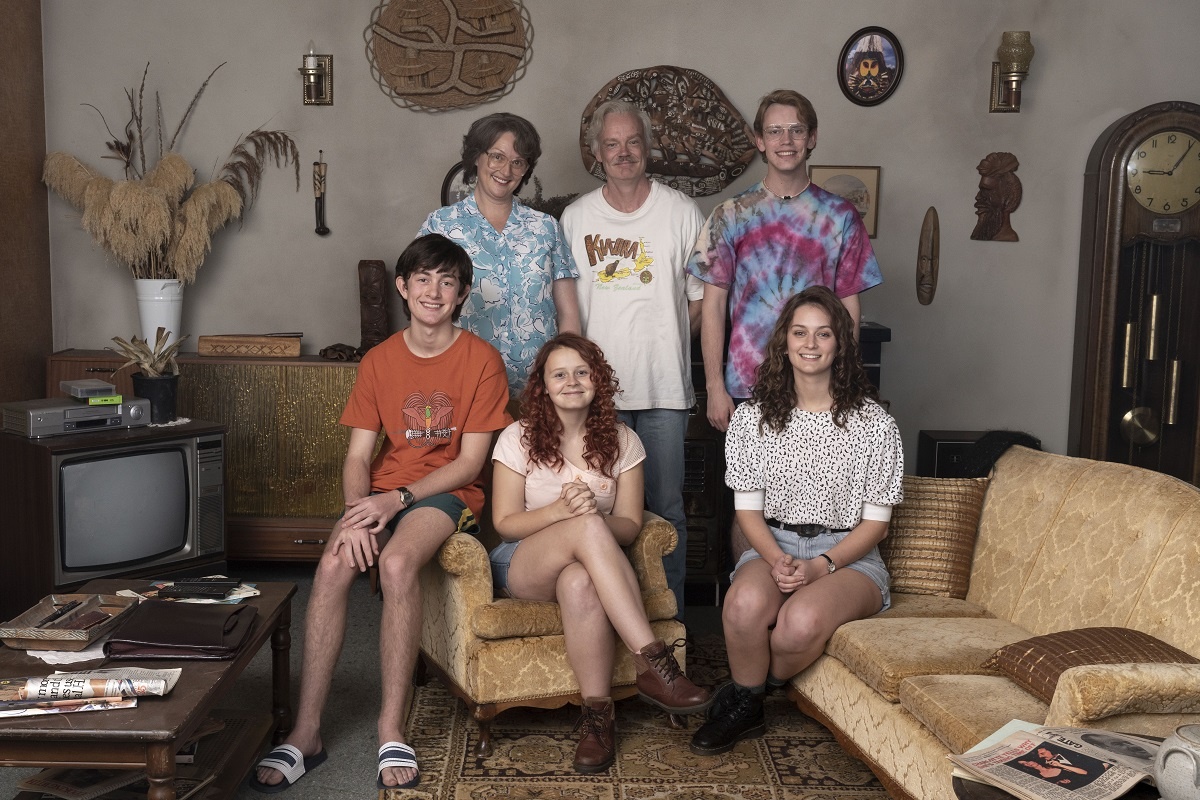Auckland screen industry’s resilience through the challenges of 2020 is exemplified in the November release of Black Hands, a television series dramatising the months leading up to the infamous 1994 murders of five members of the Bain family in Dunedin.
Brought to the small screen by Warner Bros. International New Zealand for TVNZ 1 with support from NZ On Air, Black Hands explores events prior to the murders through the eyes of the victims and the accused, David Bain, who served 13 years in prison for the crime before being acquitted in 2009.
Based on journalist Martin van Beynen’s podcast of the same name, the must-see five-part series directed by Emmy Award-winning director David Stubbs was written by veteran scribe Gavin Strawhan, and commenced filming in early March 2020 – only to be brought to a sudden halt when New Zealand went into the COVID-19 Alert Level 4 lockdown three weeks later.
Philippa Rennie, Executive Producer Black Hands says with the cast of 50 and crew of more than 100 stood down for eight weeks, much of the production team’s lockdown was spent working to help mitigate the impact of COVID-19 on the wider screen community and the production itself.
“As well as working with screen guilds and associations to find ways to get the industry back up and running, Black Hands was facing significant challenges with shooting timelines and things such as continuity – ranging from an actor’s hair colour and cut through to the physical changes the cast might experience over a couple of months.”
That was particularly the case with talented young actors Richard Crouchley, Lucy Currey, Amelia Elliot and Angus Stevens, who played the Bain family children David, Arawa, Laniet and Stephen – working alongside established Kiwi stars Joel Tobeck and Luanne Gordon as parents Robin Bain and Margaret Cullen.
Throughout lockdown, Philippa Rennie worked with Black Hands producer Robin Scholes and co-producer Tina Archibald to reposition the project and implement health protocols to ensure filming could safely resume when permitted to do so.
“It was heart-breaking for Black Hands to be shut down but through a collective effort and supportive screen community, we started filming again at Alert Level 1. We’re proud to say Black Hands was one of the first scripted drama productions in New Zealand and the first Warner Bros. International production in the world to recommence filming in the era of COVID-19,” says Philippa Rennie.
Jasmine Millet, Screen Auckland Manager, says the screen industry was among many impacted by restrictions to manage the coronavirus pandemic.
“Filming and post-production across New Zealand was severely disrupted by the pandemic. However, it was inspiring to see the resilience of our screen community – including productions such as Black Hands – as it came together to develop ways of working safely in a COVID-19 world,” says Jasmine Millet.
This included Screen Auckland’s role in the development of the government-approved national ScreenSafe COVID-19 Health and Safety Standard and Protocols, and Screen Auckland COVID-19 Alert Level Guidelines for Filming.
“The ScreenSafe protocols and Screen Auckland guidelines provide a comprehensive framework to ensure productions are shooting safely at all but the highest COVID-19 Alert Level 4. This is reassuring for both cast and crew, and members of the public, who may rightly question why filming is happening at a particular Alert Level,” says Jasmine Millet.
The Black Hands shoot was successfully wrapped and post-production underway when the Auckland regional Alert Level 3 lockdown came into effect in mid-August, again disrupting work on the television series.
Philippa Rennie says the Auckland screen industry’s capacity for remote working ensured post-production was able to continue when businesses essential to this workflow were closed.
“You can’t help but admire the resilience and determination of the Auckland screen community. With the support of the fabulous people at Images and Sound, the region’s excellent technicians, and Black Hands editor Allanah Bazzard, we were able to securely and safely deliver a premium drama from dispersed locations,” says Philippa Rennie.
As well as demonstrating the Auckland industry’s ability to successfully navigate COVID-19, Black Hands showcases the region’s versatility as a screen destination, with New Zealand’s largest city standing in for Dunedin, a much smaller heritage city in the country’s deep south.
Recreating the Bain’s rundown and cluttered Every Street house, the scene of the family murders, was central to the series' storytelling. The production secured an Onehunga property for exterior shots and a photorealistic aerial view was created by combining drone footage captured by Sam Peacock with the matte painting skill of artist Dave Gibbons. Sets for the Bain family home interior and a Dunedin police station were established at a Māngere warehouse.
Screen Auckland facilitated Auckland Council film permits for a range of locations across the region including: David Bain’s paper run on the streets of Helensville; target practice and driving scenes at Colin Dale Park; street and park scenes in Devonport; a North Shore site to stand in for emergency services’ arrival at the Bain household; and ramshackle flats in Newmarket.
Jasmine Millet says the region has again proven its worth as a blank canvas for storytelling.
“Whether sourcing from the new Screen Auckland locations gallery or taking a bespoke approach, our screen team works with productions to find locations to meet their needs. In the case of Black Hands, Auckland became Dunedin so convincingly, a journalist mistook a foggy Onehunga street for the real Every Street.”
Black Hands is screening on TVNZ1 and TVNZ OnDemand in New Zealand and will appear on Nine Network in Australia.
Images courtesy of Warner Bros. International New Zealand, 2020.
